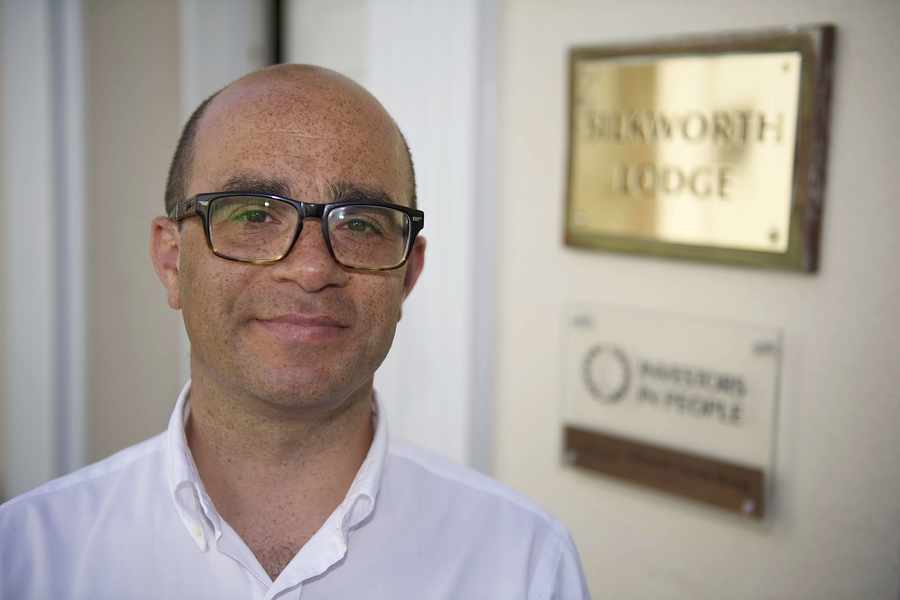- Revealed – the hidden problem of drug addiction among Jersey’s professional class
- White-collar workers make up a third of those seeking help for drug addiction
- Interview with former finance worker who became addicted to cocaine
- Comment: Read what the JEP thinks
HARDCORE drug addiction among the Island’s professional class is a hidden problem, with about a third of those seeking help being white-collar workers, according to the head of a rehabilitation centre.
Jason Wyse, chief executive of the Silkworth Charity Group, said that as many as 30 to 40 per cent of the addicts they treat are ‘professional workers’.
And Michael Gafoor, head of the Island’s Drug and Alcohol Service, said he believed the use of class A drugs, such as cocaine, was prevalent among Islanders in top jobs as it feeds their ‘champagne image’.
The senior Health official said many users do not see their habit as a problem so do not come forward, or instead have enough money to pay for private rehabilitation abroad.
Mr Gafoor added: ‘The champagne image of cocaine makes it popular among successful professional groups as a weekend party drug as opposed to the rough connotations associated with heroin and crack.
‘Many cocaine users do not consider their drug use problematic and those that do tend to fund private treatment off-Island.’
- The Silkworth Charity Group provides help to people in the Channel Islands who are suffering with alcohol or drug addiction, including at its rehabilitation centre at Silkworth Lodge, 6 Vauxhall Street.
- They can be contacted on 729060 or be emailing info@silkworthlodge.co.uk.
- For more information visit the website here.
Although it is believed that cocaine use has dropped in recent years, many users are now turning to so-called legal highs which mimic the effects of the class A drug.
It comes as a former finance professional and cocaine addict, who says she ‘aspired’ to become a user of the class A drug to feed her ‘champagne lifestyle’, has spoken publicly about how her habit nearly cost her her life.
In an interview published below, the woman, who has asked to remain anonymous, says cocaine use is rife among professionals in Jersey – especially those in the finance industry – and added that her drug-dealers were fellow employees working in the business.
At the height of her addiction the woman says she was spending over £1,000 a month on cocaine and ecstasy and snorting lines of the stimulant at work in between trips to the pub.

Mr Wyse, who supported the woman at Silkworth Lodge, the charity’s residential rehabilitation centre in St Helier, added that the stereotypical image of a homeless, down-and-out drug user ‘could not be further from the truth’ and warned that addiction can affect anyone, from any walk of life.
‘Around 30 to 40 per cent of people that come into treatment at Silkworth Lodge are people that have been in professional employment,’ he said.
‘Nobody chooses to go out and cause chaos and mayhem in their life and the lives of their families and significant others through addiction.
‘Many people function daily under the influence of drugs and alcohol – this could mean holding down a job or carrying on with family commitments. There is, however, one thing that is certain – at some point something has got to give as the pressure of maintaining their so-called normal life will start to become unmanageable and things will slowly start to spiral out of control.’

A former finance industry high-flier tells the JEP how she fell in love with the drug and the party lifestyle that went with it until it cost her everything
She fell in love with the class A drug when she was just 21. It was her tool to make the time between Friday and Monday feel longer and the highs from ecstasy seem even stronger.
But her recreational dabbling soon escalated into a £1,000 a month habit. At the height of her drug use she was snorting lines at work in between trips to the pub and indulging her habit at lavish private parties full of professionals and high-earners.
Eventually her addiction cost her her dream job, marriage, clean criminal-record and nearly her life.
‘For me it was an aspiration to be a cocaine user. It was a status symbol, like drinking champagne. All the glamour and prestige that was attached to cocaine was appealing. It was all part of my champagne lifestyle. I once said to an ex-boyfriend that I wanted to be able to afford a £300-a-week cocaine bill, that was something I was aiming for. I was wearing a suit, working in finance, playing hard at weekends – cocaine was the icing on the cake. If I felt like that, I imagine others did too.’
Her first experience of cocaine came through a former boyfriend who would buy it casually from dealers in pubs in the Island. At that time life was on the up for Katherine. She was earning good money, working in her chosen profession and living life to the full once Friday came.
‘I loved it. I was a full-time weekend warrior – finance professional Monday to Friday and seasoned party-goer at the weekend,’ she said.
However, her drug use escalated when she moved to Switzerland to work in finance in the mid-2000s. Her colleagues were keen cocaine users and the drug was easier and cheaper to source.
After a three-year spell in Europe she returned to Jersey when her cocaine use was spiralling dangerously out of control and putting her career and and her relationship under threat as, according to her, she ‘only loved cocaine’.
Katherine said that once she was back in Jersey she did not go looking for the drug, it just found her.
‘I did not notice it but I was probably spending £1,000 a month on drugs like cocaine and ecstasy, which is a lot of money. But it’s only looking back now that I notice it. I was paying between £70 and £100 per gram.’
The recovering addict, who was sentenced to more than two years in prison for possessing the drug with intent to supply several years ago, said she had personally never had bad experiences as a result of a dangerous batch of the drug but said some supplies were exceptionally pure.
‘The cocaine I got into trouble for was 76 per cent pure, which is strong. I have never really had a bad turn but I remember being at a party where a gentleman was having perpetual nosebleeds because the cocaine can be cut with shards of glass because it lacerate bloods vessels in the nose to get into the bloodstream quicker.’
After she was released from prison Katherine moved to the UK to live with her husband, who was unaware of her drug use, in an effort to get clean. However, her problems only escalated when she met her new neighbour – a cocaine dealer.
Her marriage fell apart and after returning to Jersey again, Katherine went on a ‘ten-day bender’. Her family were at a loss. She says her father had been robbed of his ability to support and help his daughter and she ‘wanted to die’.
It was then she turned to the Silkworth Charity Group, which offers a residential rehabilitation clinic for addicts in Jersey, for help.
After nearly a year of treatment with the charity Katherine has now been clean from drugs for over 20 months and is back in employment, although not in the finance industry. She says she owes her life to Silkworth.
‘I wanted to die only because I could not see how else I could get out apart from death. Death was the only solution and when you’re stuck in the corner and it’s lonely and frightening and someone shines a torch and says “walk that way, it will be okay” it is special. Silkworth was that torch.
‘It is hard to put into words what they did for me. Every morning I am grateful. I did not think I could get back from where I was – I could not see a way out. I did the work but Silkworth showed me the way. I cannot verbalise what they did. I owe them everything.’
Katherine said the Island and the world needs to know that addiction is not just a problem that can affect a small proportion of society and urged those who think they have a problem to come forward and seek help – before it is too late.
‘People have to appreciate that addiction is not choosy, it does not pick people because they are down and out and their parents did not love them, it just does not work like that.
‘If you’re going to work and you’re hiding some problems from your family but inside you’re crippled, find that bit of courage to say something. At the end of the day it is the difference between life and death.
‘If you have a drug problem but also have the family and the job and the car and the house and you feel like you’re the only person who is like that. I can promise you you’re not.’
TODAY’S powerful warning about cocaine use comes not from health officials, experts or even the police, but from a user of the drug.
To her family and friends, the high-flying finance worker was a successful businesswoman.
But she was hiding a dark secret – one that would ultimately cost her her job, her marriage, her clean police record and very nearly her life.
It started as a weekend dabble with the class-A drug but soon spiralled out of control, with her spending £1,000 a month on the substance.
The woman, who has come forward to tell her story, reveals today how destructive drug use can be, no matter what position you hold in society.
The majority of people will be shocked and surprised to read her account of the extent of drug use in the office environment; indeed, up to 40 per cent of those people treated for drug addiction in Jersey are white-collar workers.
Sadly, many reading her account tonight will be able to relate to it, and one can only hope that some of those who do will take heed of her warning and do something about it.
Her story should also act as a warning to others, particularly those young men and women entering the workplace – some of whom can leave education and be earning more than £30,000 a year in the finance industry while still living relatively cheaply at home.
The temptation to party with the ‘big boys’ in order to advance their careers could introduce them to a morally corrupt and ultimately devastating scene.
What is the solution? There is no easy answer, if indeed there is one at all. This problem has been with us for years and, in some quarters, will continue.
But this is an issue for the whole of society and not just those trapped in the seemingly endless pit of drug addiction. As a community, it is vital that we all continue to highlight this and many other problems that Islanders are either completely oblivious to or choose to ignore – even if it is a problem which does not affect us directly.
Yes, relatively speaking, we live in a safe, low-crime and healthy community, but that comfort and security should not distract or cloud our view of the complete Jersey with its many hidden problems.







